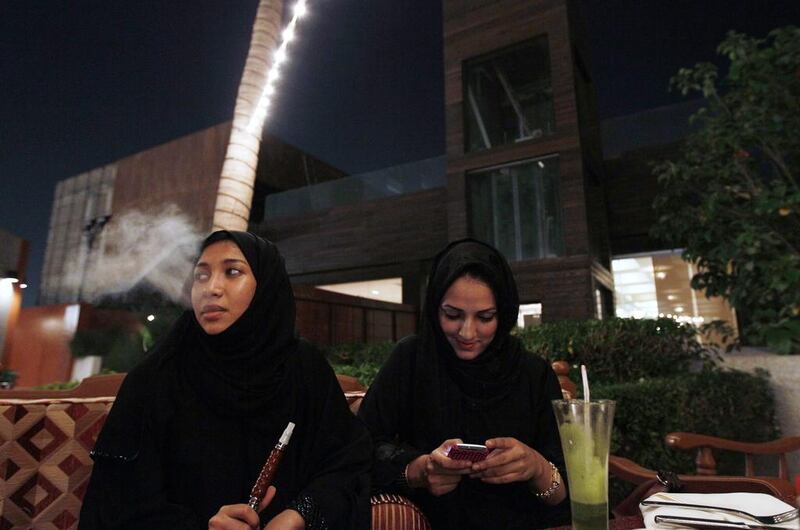JEDDAH // Amna Fatani knows she wants a brilliant career and a life different from that of Saudi women of her mother’s generation.
Women in that generation married early, usually to a husband not of their own choosing.
The 27-year-old, studying for her master’s degree at Georgetown University in Washington, is part of a growing number of Saudi women choosing to remain single through their 20s and into their 30s as they pursue other ambitions.
The trend has ruffled ultraconservatives who see it as an affront to the very foundations of the kingdom, where strict interpretations of Islam and rigid tribal codes have long dictated the terms of marriage.
“I need someone who trusts that if I need to do something, I can make the decision to ask for help or choose to do it alone,” she said.
Saudi women stand at the centre of a societal pivot between the kingdom’s push for greater women’s rights to work and education, and laws that give men the final say over their lives.
Women cannot travel, study abroad, marry or undergo certain medical procedures without the permission of a male guardian.
The growing number of single women has alarmed clerics, who have responded by pushing for early marriage and warning of alleged evil consequences of “spinsterhood” such as sex outside wedlock.
In a 2005 sermon, the imam of Mecca’s Grand Mosque, Abdul Rahman Al Sudais, spoke out against “the dangerous phenomenon of life-long spinsterhood” saying it endangers “the community as a whole”.
Traditionally, women in Saudi Arabia are expected to be married by their early 20s. In 2011, more than 1.5 million Saudi women aged over 30 were single, according to the economy and planning ministry.
According to government figures, 3.3 million are women over 30 in a nation of 20 million people. If the ministry’s 2011 figure is unchanged, it means that about 45 per cent of Saudi women over 30 are single.
Education is also changing women’s attitudes toward marriage and giving them more confidence, said Hatoon Al Fassi, a professor of women’s history in Saudi Arabia. “You can no longer control these attitudes,” she says.
Some Saudi women are also challenging the rules on how to meet a prospective husband as they navigate through tradition and customs.
Families are expected to arrange or, at the least, approve marriages. Conservative families see the idea of a daughter looking for a match on her own as scandalous. Entrenched tribal customs also weigh strongly.
In the conservative central Najd region – the home to the capital, Riyadh – women are often barred from marrying outside their tribe. One young woman said that her sister fell in love with a Saudi man who was not from a tribe. Their father agreed to the marriage after meeting him, but an older male relative threatened to cut off the entire family if the marriage went ahead.
The sister was forced to end the courtship and eventually married a man from her tribe.
Parents usually arrange a “showfa” – Arabic for a “viewing” – so a man can see his potential bride at her home, without the abaya and shayla Saudi women usually wear in public.
However, stories of secretive courtships away from parents’ prying eyes abound in Saudi Arabia.
One woman said she spent months chatting with a man online. They finally agreed to meet at a grocery store, where they texted from opposite ends of an aisle. They spoke face-to-face for the first time when he asked her father for her hand in marriage. Some Saudi media have joined the clerics in hand-wringing over – as one newspaper put it – “the army of spinsters”. A Saudi writer for the Al Sharq news website called the phenomenon a “cancer” in society, leading to vice. Popular Saudi talk show host Dawoud Al Shiryan dedicated an entire recent broadcast to discuss spinsterhood.
Some pundits have blamed fathers for demanding exorbitant sums of money from male suitors and have even accused them of intentionally keeping their working daughters single because they rely on their income.
But ultimately, many Saudi women are staying single longer by choice.
Fatani wants a husband who has also lived abroad and has aspirations similar to hers - she hopes someday to become Saudi Arabia’s first female labour minister. She prefers to meet him outside of an arranged setting and wants the chance to experience “things like grocery shopping together” before deciding if she wants to marry him.
“I definitely want to know him outside a traditional showfa,” she said.
* Associated Press





